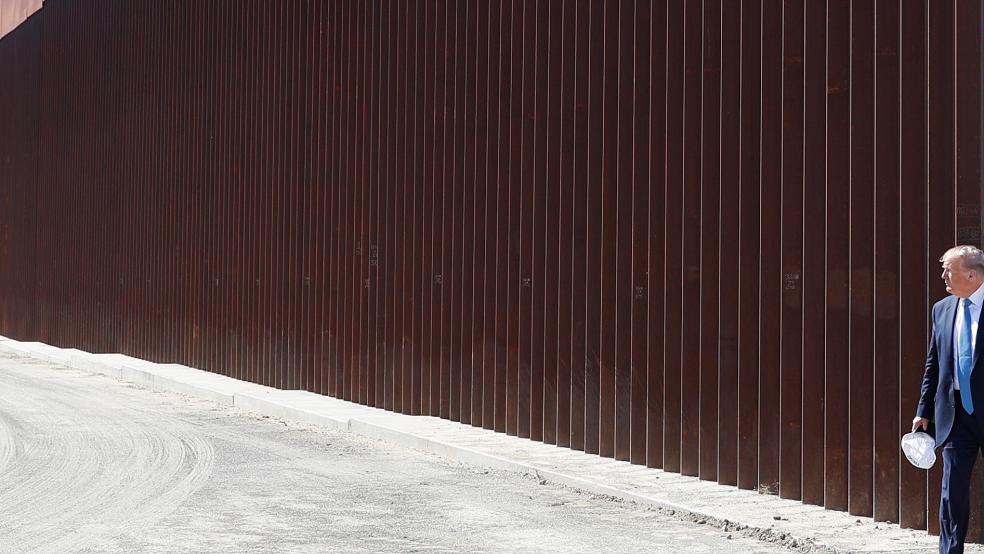President Trump is planning to shift $7.2 billion in Pentagon funds toward construction of border barriers this year — more than his administration reprogrammed last year and five times what Congress authorized for 2020, The Washington Post’s Nick Miroff first reported:
“Trump took $2.5 billion from military counterdrug programs for border barrier construction in 2019, but this year his administration is planning to take significantly more — $3.5 billion. Trump administration officials also are planning to take $3.7 billion in military construction funding, slightly more than the $3.6 billion diverted in 2019.
“The move would bring the total amount of federal funds allocated to border fencing to $18.4 billion under Trump, who made the border barrier a priority during his campaign for the presidency in 2016. He also pledged to make Mexico pay for the barrier, delighting crowds at his rallies.”
Administration officials reportedly cautioned that the final totals could still change.
One eye on the election: The plans are part of an administration effort to “show major progress” on Trump’s signature campaign promise ahead of the 2020 election, The New York Times reports. The administration recently announced that it had completed 100 miles of barriers along the southern border, well short of the 450 miles the president has repeatedly pledged to put up by the end of this year. The funding plans would reportedly give the government enough money to complete nearly 900 miles of fencing by spring 2022, though a large portion of that would likely replace existing barriers.
As CQ defense policy reporter Andrew Clevenger notes, the Pentagon projects that have seen their funding halted or delayed have disproportionately been in Democratic regions — and that’s likely to be the case again this year. “Once the Pentagon identifies which MilCon projects are being halted to come up with $3.7B, it's a safe bet that most of the $$ will come from Dem-controlled areas,” Clevenger tweeted. “And swing states that POTUS needs to carry to win re-election will probably avoid the worst of it.”
More pushback from lawmakers, including Republicans: The administration’s shifting of Pentagon funds has angered members of Congress, many of whom object to what they call an abuse of power and encroachment on their constitutional power of the purse. “Having failed to get his way in Congress, it appears President Trump is now once again forcing service members and their families to pay for his wall by cancelling even more vital military construction projects,” House Democratic appropriators said in a statement.
Some Republicans, while more subdued, also voiced concerns. “I wish they’d get the money somewhere else, instead of defense," Senate Appropriations Chairman Richard Shelby of Alabama told reporters on Tuesday. "But I do support building the wall.” Other Republicans said Democrats had forced Trump to redirect the money by refusing to provide additional border funding.
Challenges have failed: Lawmakers and the courts opened the door to this second round of reprogramming of Pentagon funds. Congress twice voted to terminate Trump’s national emergency declaration, but each time failed to come up with enough votes to override a presidential veto. And the 2020 spending deal passed by Congress in December, which allocated $1.375 billion toward border barriers, placed no limitation on Trump’s ability to redirect military money slated for other purposes.
Legal challenges to Trump’s border wall also have failed to stop construction. A federal appeals court last week allowed the administration to tap $3.6 billion in military construction funds for the border barrier, reversing a lower court decision that halted use of the funds and called Trump’s national emergency declaration unlawful. The Supreme Court had previously allowed the administration to proceed with construction using $2.5 billion in Pentagon counter-drug funding while litigation in that case continued.
The Trump administration reportedly felt empowered to redirect larger amounts of money this year following the latest court decision.
The bottom line: The administration’s plans are sure to reignite the debate over the president’s money grab — and they likely signal that the border wall will once again play a central role in Trump’s election campaign. “It's not surprising that the White House is moving forward with this method to pay for a major campaign issue,” Clevenger tweeted. “It worked before, and Congress has thus far not mustered the collective will to stop it.”





